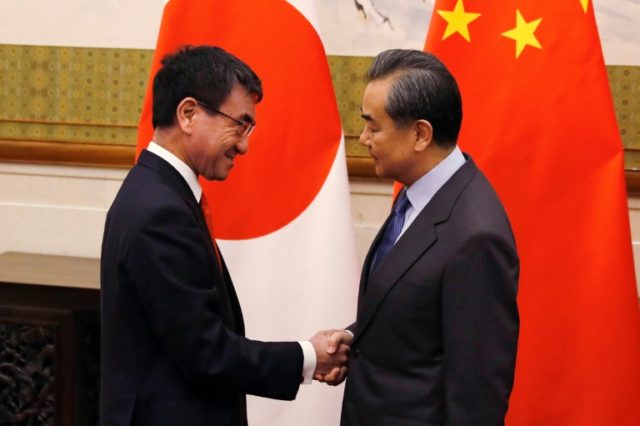China’s state-run Global Times expressed delight Sunday with Japan’s growing participation in the “Belt and Road” infrastructure project, through which China hopes to extend economic and political influence from Asia through the Middle East and Europe.
The editorial signaled that if the Japanese play ball with Belt and Road, Beijing might even stop referring to them as history’s greatest monsters.
Much bad blood between China and Japan flows from the Japanese invasion in World War II, but the Global Times decorously restrained itself to more recent history and praised Japan for extending an “olive branch” to end six years of tension:
Relations between Tokyo and Beijing have been at a low point since 2012, partly due to the territorial dispute over the Diaoyu Islands, but the two countries broke the deadlock in 2017 as Chinese President Xi Jinping met with Japan’s Prime Minister Shinzo Abe in Hamburg, Germany. As bilateral relations warm up, some Chinese scholars have begun to rethink China’s stance toward Japan. Many people agreed that China needs to view Japan as a strategic cooperative partner, instead of an enemy, although historical issues cast a shadow over bilateral ties.
China and Japan should seize the chance to normalize relations and build closer ties. The first step is to push forward economic cooperation among private companies, and infrastructure is a good starting point to strengthen international cooperation.
Competition between China and Japan for infrastructure projects in Asia has heated up significantly in recent years. Blindly pursuing these deals has exposed some companies and financial institutions to high risks as a new price war looms in the Asian market. It is time for the two countries to change the situation.
Earlier this year, China and Japan reportedly reached a consensus on establishing a public-private communication platform to discuss joint projects in third markets related to China’s Belt and Road (B&R) initiative. If trial projects go well, bilateral ties may move to a new stage. Cooperation will become the main subject of Sino-Japan relations.
China would love to peel Japan away from the United States and weaken Tokyo’s appetite for leading a coalition of capitalist Asian nations against Chinese influence. The source of China’s current happiness is the willingness Japan has expressed over the past two months to work with Belt and Road and give Japanese corporations enhanced shipping and financial access to Central Asian and European markets, even though Japan shows no indication of relaxing its drive to create an alternative to the Chinese infrastructure plan.
“Japanese businesses have deep experience building high-quality infrastructure, and not being part of the Belt and Road Initiative would mean that they would not enjoy the economic benefits of the initiative. There is pressure on the administration to join the Initiative so that Japanese businesses don’t lose out,” International Christian University of Tokyo professor Stephen Nagy told Forbes in April.
Dr. Titli Basu of the Institute for Defense Studies and Analyses in New Delhi proposed in a February article for the Diplomat that Japanese Prime Minister Shinzo Abe wants to invert the Belt and Road strategy, using the trade network to influence China:
Abe’s objective is to maintain the U.S.-led order that has served its national interests since the post-war era and project Japan as an effective ally to the United States in guarding the global commons. Whether it is taking the lead in TPP-11, reviving the Quad, floating the AAGC, or initiating the Vientiane Vision, Japan is demonstrating leadership in consolidating the existing order based on universal values and principles of international law.
To deliver on its international commitment to being a Proactive Contributor to Peace, Japan aims to operate within the alliance arrangement with the United States, reinforce its own national strength, and further weave action-oriented strategic partnerships in the Indo-Pacific on one hand and engage with China with the aim of shaping it as a responsible power that respects international norms on the other.
Japan’s competing infrastructure project, pushed more aggressively after the Trump administration withdrew from the Trans-Pacific Partnership, reaches all the way to Central Europe. Tokyo’s sales pitch includes warnings about the political strings that come attached to Chinese money and upselling Japanese engineering as superior to China’s. The project has encouraged an increasingly strong partnership between Japan and India, which is also eager to curb Chinese influence.
Foreign Policy noted in February that Japan has expressed support for Belt and Road and kept its options for joining the Chinese project open while it decides just how much of an obstacle to Chinese ambitions the Japan-India partnership can be, especially if it lacks significant participation by the United States.
Japan has good reasons for keeping its options open, including concerns about a sluggish economy, growing public debt, deathbed demographics, and concerns that resistance to Belt and Road will lapse without Shinzo Abe’s leadership once he leaves office.

COMMENTS
Please let us know if you're having issues with commenting.